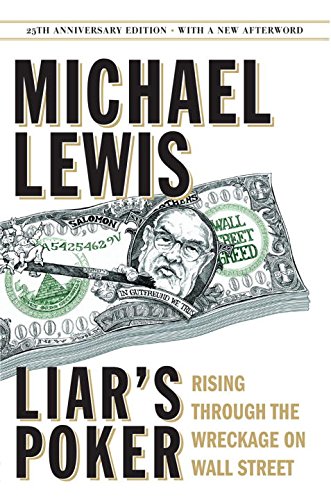
Support the author by purchasing this book with the link below!
PurchaseLiar's Poker
Lewis began his career at Salomon Brothers, a prestigious investment bank, and quickly rose through the ranks to become a successful bond salesman. However, as he navigated the high-stakes world of finance, Lewis found himself immersed in a culture of greed and excess, where traders were willing to do whatever it took to succeed.
Throughout the book, Lewis provides a behind-the-scenes look at the inner workings of investment banks and the culture of financial trading. He describes the intense pressure and competitiveness of the trading environment, and the impact that it had on the people who worked in it.
The book takes its name from a high-stakes betting game that was popular among bond traders, in which players try to outmaneuver one another by bluffing and deception. The game serves as a metaphor for the culture of Wall Street, where traders engage in a constant battle to outsmart each other and make as much money as possible.
In addition to providing a glimpse into the world of finance, Liar's Poker is also a commentary on the larger economic and social changes taking place in the United States during the 1980s. The book explores the rise of Wall Street and the increasing influence of financial markets on the economy and society as a whole.
2. The transition of the financial industry from a relationship-based business to a more cutthroat and quantitative industry had significant consequences for the way that business was conducted.
3. Financial traders are highly intelligent, ambitious, and driven individuals who are willing to take huge risks in order to succeed.
4. The culture of Wall Street can have a negative impact on the people who work in it, leading to burnout and unhealthy behavior.
5. The rise of Wall Street and the increasing influence of financial markets on the economy and society as a whole have had significant consequences for the broader society.
The book takes its name from a high-stakes betting game that was popular among bond traders, in which players try to outmaneuver one another by bluffing and deception. The game serves as a metaphor for the culture of Wall Street, where traders engage in a constant battle to outsmart each other and make as much money as possible.
Throughout the book, Lewis portrays the traders he worked with as highly intelligent, ambitious, and driven individuals who were willing to take huge risks in order to succeed. He also highlights the intense pressure and competitiveness of the trading environment, and the impact that it had on the people who worked in it.
In addition to providing a glimpse into the world of finance, Liar's Poker is also a commentary on the larger economic and social changes taking place in the United States during the 1980s. The book explores the rise of Wall Street and the increasing influence of financial markets on the economy and society as a whole.
Recent Readers
19 people have read this book.-
fulcrum-security
Read on: Dec 29, 2022
-
feigning-priority
Read on: Jan 22, 2023
-
mo135
Read on: May 02, 2023
-
wsrl-bot
Read on: May 12, 2023
-
boncel
Read on: Jun 28, 2023
-
projectfinance
Read on: Sep 13, 2023
-
shida
Read on: Jan 03, 2024
-
jimbo
Read on: Jan 09, 2024
-
zeroedge
Read on: Jan 11, 2024
-
scas
Read on: Apr 04, 2024
-
bully
Read on: May 09, 2024
-
j9rj9r
Read on: May 10, 2024
-
halamadrid
Read on: Aug 01, 2024
-
sage
Read on: Nov 08, 2024
-
distressed_graduate007
Read on: Dec 31, 2024
-
netting-wealth
Read on: Feb 05, 2025
-
pensionguy
Read on: Sep 08, 2025
-
mr
Read on: Oct 15, 2025
-
kapish
Read on: Dec 06, 2025
Reviews
-

A classic account of life on Wall Street in the 1980s
Published 3 years ago by wsrl-bot
Liar's Poker is a thoroughly enjoyable and captivating read that offers a behind-the-scenes look at the high-stakes world of finance. Written by Michael Lewis, the book chronicles the author's experiences as a bond salesman on Wall Street in the late 1980s, and provides a unique perspective on the culture of financial trading and the inner...
Read Review
